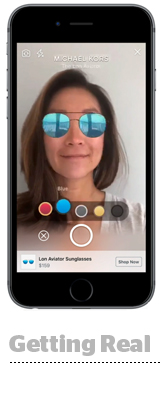
Facebook is augmenting the news feed.
The company has been testing AR ads for the past couple of months with a limited number of brands, it announced at an event for advertisers and agencies in New York City on Tuesday. The plan is to release the format more generally in the lead-up to the holiday season.
It might be July and 90 degrees outside, but advertisers are (or should be) already setting their holiday budgets, said Ty Ahmad-Taylor, Facebook’s VP of business product marketing.
“Get ready for augmented commerce,” Ahmad-Taylor said.
The format is rolling out for the retail, fashion, cosmetics, furniture, gaming and entertainment categories to start. It’ll expand to other industries down the line.
Michael Kors was the first brand to play with the new unit by allowing users to try on a pair of sunglasses and buy them directly from the AR format. Others brands are in the pipeline to run their own tests this summer, including Wayfair, Sephora, Pottery Barn and King.
Users who tap on an AR-enabled ad trigger the camera. They can take a picture of themselves or a product that essentially becomes a piece of interactive, shoppable creative. From there, they can click through and make a purchase.
For VaynerMedia, anything that has the potential to produce return on ad spend is worth testing, but buyers also have to be cautious, said EVP Travis Freeman. Brand desire for innovation doesn’t always lead to increased budgets, even during the holidays.
“This is just another creative format for us to test [and] we’re going to see how the experience works for a certain segment of consumers,” Freeman said. “We’re going to look at ROAS, brand lift and sales lift and, if it works, then it’s about how we scale the experience.”
While the ads are shoppable, it’s still unclear whether people will actually buy from them. Even if someone doesn’t buy right from the ad, though, there’s still value there, said Eva Press, Facebook’s North America group lead for global marketing solutions.
“Short of going to the store, this is the next best thing to give you more comfort and confidence in your purchase,” Press said. “This lets you visualize how a product fits into your life … and that should ultimately lead to a purchase.”
Wayfair, which plans to test Facebook’s AR ads this summer, hopes to drive app installs rather than product purchases. The app already lets users see how furniture look in physical spaces.
AR is a “great way to move the customer through the funnel,” said Jess Jacobs, Wayfair’s marketing director.
For the last couple of years, Facebook has been making a big bet on augmented reality. At its most recent developer’s conference in April, Facebook announced support for third-party AR filters in Instagram, Facebook and Messenger, as well as other tools to help devs create their own AR assets.
“There are more opportunities than ever to bring physical stores to life,” Ahmad-Taylor said. “We believe AR has the ability to redefine how people connect with businesses.”
When the AR ads beta closes before the holidays, advertisers will be able to buy the placement in Power Editor, as with any other format. All the usual personalization and targeting parameters will apply.
Beyond the AR ads test, Facebook is gearing up for the holidays with a few other products and rollouts, including a video creation kit to help advertisers repurpose their existing assets to build mobile-optimized video and general availability for shopping tags in Instagram stories and the collections ad format.
This post was syndicated from Ad Exchanger.


More Stories
Daily Wire Welcomes Perplexity to Advertise on The Ben Shapiro Show
Here’s the Roundup for the Week Ending March 7
Aflac’s Dan Amos Reveals How He’s Successfully Held Onto the CEO’s Job for 35 Years